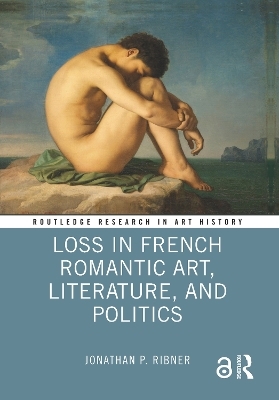
Loss in French Romantic Art, Literature, and Politics
Seiten
2023
Routledge (Verlag)
978-1-032-02704-3 (ISBN)
Routledge (Verlag)
978-1-032-02704-3 (ISBN)
- Titel z.Zt. nicht lieferbar
- Versandkostenfrei innerhalb Deutschlands
- Auch auf Rechnung
- Verfügbarkeit in der Filiale vor Ort prüfen
- Artikel merken
An interdisciplinary examination of nineteenth-century French art pertaining to religion, exile, and the nation’s demise as a world power, this study concerns the consequences for visual culture, from the Revolution of 1789, to the collapse of the Empire and the dashing of hope raised by the Revolution of 1830.
An interdisciplinary examination of nineteenth-century French art pertaining to religion, exile, and the nation’s demise as a world power, this study concerns the consequences for visual culture of a series of national crises—from the assault on Catholicism and the flight of émigrés during the Revolution of 1789, to the collapse of the Empire and the dashing of hope raised by the Revolution of 1830.
The central claim is that imaginative response to these politically charged experiences of loss constitutes a major shaping force in French Romantic art, and that pursuit of this theme in light of parallel developments in literature and political debate reveals a pattern of disenchantment transmuted into cultural capital. Focusing on imagery that spoke to loss through visual and verbal idioms particular to France in the aftermath of the Revolution and Empire, the book illuminates canonical works by major figures such as Eugène Delacroix, Théodore Chassériau, and Camille Corot, as well as long-forgotten images freighted with significance for nineteenth-century viewers. A study in national bereavement—an urgent theme in the present moment—the book provides a new lens through which to view the coincidence of imagination and strife at the heart of French Romanticism.
The book will be of interest to scholars working in art history, French literature, French history, French politics, and religious studies.
The Open Access version of this book, available at http://www.taylorfrancis.com, has been made available under a Creative Commons Attribution-Non Commercial-No Derivatives 4.0 license.
An interdisciplinary examination of nineteenth-century French art pertaining to religion, exile, and the nation’s demise as a world power, this study concerns the consequences for visual culture of a series of national crises—from the assault on Catholicism and the flight of émigrés during the Revolution of 1789, to the collapse of the Empire and the dashing of hope raised by the Revolution of 1830.
The central claim is that imaginative response to these politically charged experiences of loss constitutes a major shaping force in French Romantic art, and that pursuit of this theme in light of parallel developments in literature and political debate reveals a pattern of disenchantment transmuted into cultural capital. Focusing on imagery that spoke to loss through visual and verbal idioms particular to France in the aftermath of the Revolution and Empire, the book illuminates canonical works by major figures such as Eugène Delacroix, Théodore Chassériau, and Camille Corot, as well as long-forgotten images freighted with significance for nineteenth-century viewers. A study in national bereavement—an urgent theme in the present moment—the book provides a new lens through which to view the coincidence of imagination and strife at the heart of French Romanticism.
The book will be of interest to scholars working in art history, French literature, French history, French politics, and religious studies.
The Open Access version of this book, available at http://www.taylorfrancis.com, has been made available under a Creative Commons Attribution-Non Commercial-No Derivatives 4.0 license.
Jonathan P. Ribner is Associate Professor in the Department of History of Art & Architecture at Boston University.
Introduction 1. Amid the Debris of Our Temples 2. Agony in the Garden 3. Banished 4. “He’s Not Dead!” 5. Heroism Lost Epilogue: After the Terrible Year
| Erscheinungsdatum | 02.09.2021 |
|---|---|
| Reihe/Serie | Routledge Research in Art History |
| Zusatzinfo | 32 Halftones, color; 57 Halftones, black and white; 32 Illustrations, color; 57 Illustrations, black and white |
| Verlagsort | London |
| Sprache | englisch |
| Maße | 174 x 246 mm |
| Gewicht | 620 g |
| Themenwelt | Kunst / Musik / Theater ► Kunstgeschichte / Kunststile |
| Geisteswissenschaften ► Sprach- / Literaturwissenschaft ► Anglistik / Amerikanistik | |
| Geisteswissenschaften ► Sprach- / Literaturwissenschaft ► Literaturwissenschaft | |
| Sozialwissenschaften ► Soziologie ► Spezielle Soziologien | |
| ISBN-10 | 1-032-02704-5 / 1032027045 |
| ISBN-13 | 978-1-032-02704-3 / 9781032027043 |
| Zustand | Neuware |
| Informationen gemäß Produktsicherheitsverordnung (GPSR) | |
| Haben Sie eine Frage zum Produkt? |
Mehr entdecken
aus dem Bereich
aus dem Bereich
Poetik eines sozialen Urteils
Buch | Hardcover (2023)
De Gruyter (Verlag)
59,95 €
Buch | Softcover (2024)
belleville (Verlag)
20,00 €


